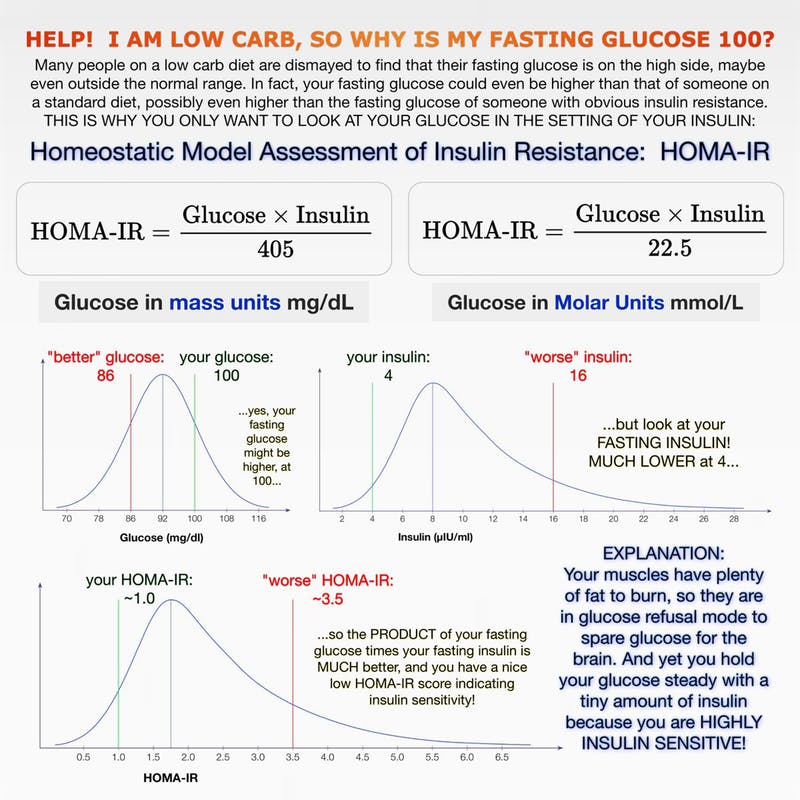I’m thinking I should hold off on fasting until my BS’s are more stable.
My morning readings range from high 80’s to at most 110. If I continue on fasting through the day they jump to 180-215 and I haven’t had anything other than water. I’m really concerned my next HA1C will be skewed by this.
To fast or not to fast, that is the question
Elevated blood sugars while fasting
Lots of people get the same thing because their body is eating up the fat stores and that includes the years old glucose stored with them
There’s nothing that can be done about it as the fat needs to go, it’s just something that has to be worked through and your body will thank you for doing it. Always focus on how you feel above all else and as long as you feel good keep going.
For what it’s worth, there is a phenomenon called “physiological insulin resistance,” in which fat-adapted muscles refuse to use ketone bodies and glucose, because they are saving them for those cells that absolutely require them. The elevation of serum glucose that results doesn’t appear to affect our hemoglobin. I wonder if it might not be the same when we fast, as long as we’re eating ketogenically when we do eat.
In any case, we know that our ancestors have been feasting and fasting for something in the neighborhood of two million years, so it would be unlikely for us to be suddenly discovering a problem with fasting at this late date.
I got a continuous glucose monitor to get a better idea of how foods are affecting me. Everyday starting at 9am my blood sugar starts rising to ridiculous levels until it starts to go down around 11-noon. I saw my PhD researcher/nutritionist and he said metabolically i shouldn’t be IF right now (he is pro fasting and pro Keto). He suggested a 20+gram fat bomb in the AM. This is your body reacting to fasting by trying to take action. Considering somewhere around 140 is where the major damage occurs I would try other things to prevent that spike. I’m assuming after long term Keto this will become less of an issue.
Fwiw, if I do even moderate exercise (walk my 1/2 mile hill to my house) I can drop 50 points of bg if it’s really high in the am. 180 -> 130. This is just for morning fasted high bg. Obviously if you have a meal then all bets are off.
Now, if it’s 130 to start, I can drop it 5 points.
In your case I think it’s just because you have low insulin from the morning effect so you have a tablespoon of sugar floating around with no where to go. Keep fasting.
This is interesting and I like to speculate on possibilities so here are a few:
Well below 145 after you eat (post meal) is were you would want to see it meaning you are becoming more insulin sensitive?
image link
Endogenous Glucose:
When you are above 145 (180-215); when you are fasting it means your liver is making glucose which is not the same as eating glucose which means it may not be triggering insulin as much?
Exogenous Glucose:
The postprandial kind of glucose that comes from the diet after you eat (post meal) means you do not have enough insulin to process that kind of glucose depending on amount which inhibits the release of hepatic glucose[3]?
Estrogen, Cortisol & Insulin:
Insulin is so tricky because levels of estrogen can trigger insulin (to store fat for secondary female sexual characteristics or subcutaneous distribution of body fat specific to the female anatomy) without glucose or in its absence and so can cortisol from stress which can release hepatic glucose possibly triggering a little insulin?
Insulin is like a stealthy paradoxical little cobra!
Insulin can also get jammed or stuck at any point within the matrix of the human micro physiology.
References:
[1] “…Glucose levels accounted for 52% of the insulin output and 29% of the insulin/glucose index variance. Neither age, parity, nor obesity contributed significantly to insulin levels in the multiple regression model. …” …More
[2] “…Regulation of exogenous and endogenous glucose metabolism by insulin and acetoacetate in the isolated working rat heart. A three tracer study of glycolysis, glycogen metabolism, and glucose oxidation: “…Insulin-stimulated glucose uptake and lactate production in the absence of acetoacetate, while acetoacetate inhibited the uptake of glucose and the oxidation of both exogenous glucose and endogenous carbohydrate. Depending on the metabolic conditions, the contribution of glycogen to carbohydrate metabolism varied from 20-60%. The addition of acetoacetate or insulin increased the incorporation of exogenous glucose into glycogen twofold, and the combination of the two had additive effects on the incorporation of glucose into glycogen. In contrast, the glycogen content was similar for the three groups. The increased incorporation of glucose in glycogen without a significant change in the glycogen content in hearts perfused with glucose, acetoacetate, and insulin suggests increased glycogen turnover. We conclude that insulin and acetoacetate regulate the incorporation of glucose into glycogen as well as the relative contributions of exogenous glucose and endogenous carbohydrate to myocardial energy metabolism by different mechanisms. …” …More
[3] EFFECTS OF EXOGENOUS AND ENDOGENOUS INSULIN ON GLUCOSE UTILIZATION AND PRODUCTION (year 1959)

